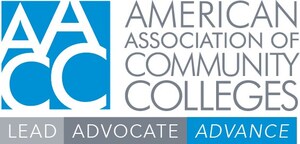Community Colleges Take Major Step in Defining Role, Effectiveness
New National Accountability Measures Drill Down on Unique 2-Year Mission
WASHINGTON, Dec. 1, 2011 /PRNewswire-USNewswire/ -- Following 18 months of intensive research, analysis and pilot testing, the American Association of Community Colleges (AACC) and its partners today launch the first-ever custom framework to measure how 2-year colleges perform in serving their more than 13 million students.
The Voluntary Framework of Accountability (VFA), along with its newly-minted Metrics Manual v. 1.0 (www.aacc.nche.edu/vfa), will give community colleges what many believe has long been lacking in reporting their successes to the public and policymakers: specific metrics that assess how they do in areas such as student progress and achievement, implementation of career and technical education programs (credit and noncredit) and transparency in reporting outcomes. Until now, the colleges have been largely assessed using the same measures as 4-year universities, which, in many cases do not match their mission or the characteristics of their student populations.
"Many traditional measures of institutional effectiveness can produce an incomplete or inaccurate picture of community college performance," said AACC President and CEO Walter G. Bumphus. "For example, most national assessments are pegged to full-time students, but the majority of community college students attend part time. Given the increasing reliance on our colleges to educate the growing numbers of students to keep our nation competitive, it is essential that the public and policymakers understand what we do and how well we do it."
The VFA has engaged leaders across the community college landscape, including presidents, institutional researchers and trustees/governing boards. In addition, the proposed metrics were pilot tested over a 5-month period by 58 community colleges, both large and small and including two state systems (see a list of colleges and information on pilot testing at http://www.aacc.nche.edu/Resources/aaccprograms/vfa/Pages/PilotTesting.aspx).
The release of the metrics manual will give each community college a roadmap to greater and more rigorous accountability with clearly defined measures, methodologies and context provided via the pilot colleges' "test drive" and evaluation. The AACC Board of Directors strongly supported the VFA at their November meeting, and over the next several months AACC will urge adoption of the framework among member colleges, along with promotion of its value to college boards, state accountability offices and accrediting bodies.
"We believe the VFA can be the foundational accountability framework for our colleges for now and into the future," said Bumphus. "We are committed to ensuring that the core measures are usable and relevant and that the framework is dynamic enough to accommodate changes in our sector, the technology we use and the types of data to be reported."
To underscore the association's commitment, AACC and its partners will seek endorsements of the VFA by accrediting bodies and adoption by states or systems. AACC is also seeking collaboration with third-party associations including the National Governors Association and Phi Theta Kappa, on areas related to completion and accountability initiatives. The work of the VFA informed AACC's recommendations to the federal Committee on Measures of Student Success (CMSS). CMSS has been charged with making recommendations to the secretary of education for how 2-year colleges can better report graduation rates.
Joining AACC in this landmark VFA effort are the Association of Community College Trustees (ACCT) and the College Board. Funding for the VFA has been provided by the Bill & Melinda Gates Foundation and Lumina Foundation.
The American Association of Community Colleges is a national organization representing the nation's 1,197 community, junior and technical colleges and their more than 13 million students. Community colleges are higher education's largest and fastest growing sector, currently enrolling close to half of all U.S. undergraduates. For more information and a listing of community colleges nationwide, see www.aacc.nche.edu. For daily news about community colleges and key issues affecting them, sign up to receive the Community College Times at www.communitycollegetimes.com.
Founded in 1972, the Association of Community College Trustees (ACCT) is the nonprofit educational organization of governing boards, representing more than 6,500 elected and appointed trustees of community, technical, and junior colleges in the United States and beyond. ACCT's purpose is to strengthen the capacity of community, technical, and junior colleges and to foster the realization of their missions through effective board leadership at local, state, and national levels. For more information, visit www.acct.org. Follow ACCT on Twitter at twitter.com/CCTrustees.
The College Board Advocacy & Policy Center was established to help transform education in America. Guided by the College Board's principles of excellence and equity in education, the Center works to ensure that students from all backgrounds have the opportunity to succeed in college and beyond. Critical connections between policy, research and real-world practice are made to develop innovative solutions to the most pressing challenges in education today. Drawing from the experience of the College Board's active membership consisting of education professionals from more than 5,900 institutions, priorities include: College Preparation & Access, College Affordability & Financial Aid, and College Admission & Completion.
Lumina Foundation, an Indianapolis-based private foundation, is committed to enrolling and graduating more students from college—especially 21st-century students: low-income students, students of color, first-generation students and adult learners. Lumina's goal is to increase the percentage of Americans who hold high-quality degrees and credentials to 60 percent by 2025. Lumina pursues this goal in three ways: by identifying and supporting effective practice, through public policy advocacy, and by using our communications and convening power to build public will for change.
Guided by the belief that every life has equal value, the Bill & Melinda Gates Foundation works to help all people lead healthy, productive lives. In developing countries, it focuses on improving people's health and giving them the chance to lift themselves out of hunger and extreme poverty. In the United States, it seeks to ensure that all people—especially those with the fewest resources—have access to the opportunities they need to succeed in school and life. Based in Seattle, Washington, the foundation is led by CEO Jeff Raikes and Co-chair William H. Gates Sr., under the direction of Bill and Melinda Gates and Warren Buffett.
SOURCE American Association of Community Colleges
WANT YOUR COMPANY'S NEWS FEATURED ON PRNEWSWIRE.COM?
Newsrooms &
Influencers
Digital Media
Outlets
Journalists
Opted In




Share this article